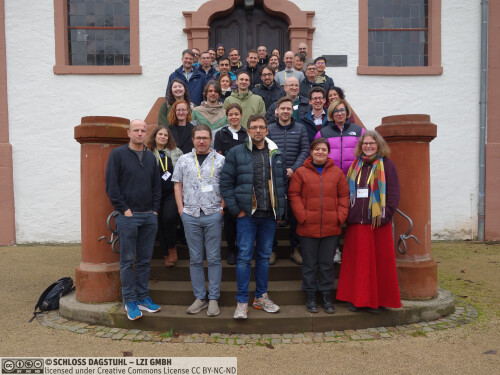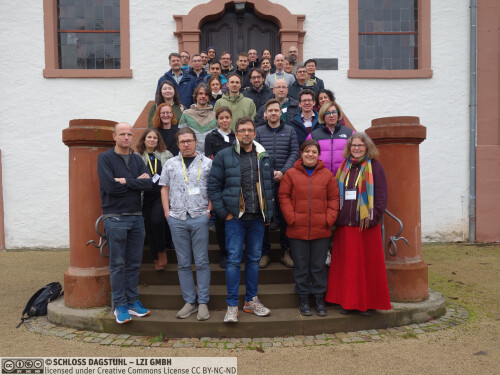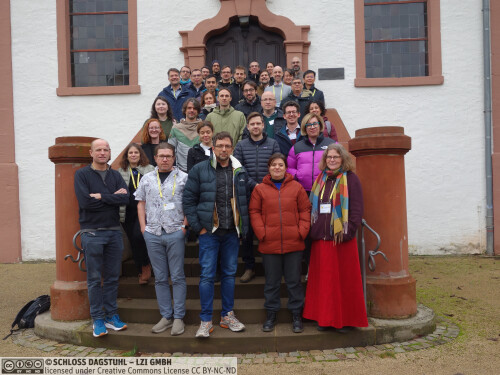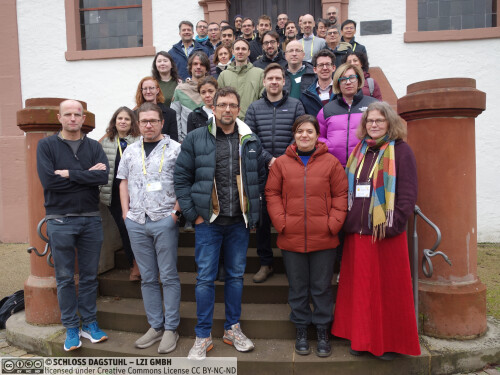Dagstuhl Seminar 24491
Deep Learning for RNA Regulation and Multidimensional Transcriptomics
( Dec 01 – Dec 06, 2024 )
Permalink
Organizers
- Annalisa Marsico (Helmholtz Zentrum München, DE)
- Uwe Ohler (Max-Delbrück-Centrum - Berlin, DE)
- Igor Ulitsky (Weizmann Institute - Rehovot, IL)
- Gene Yeo (University of California - San Diego, US)
- Kathi Zarnack (Universität Würzburg, DE)
Contact
- Marsha Kleinbauer (for scientific matters)
- Christina Schwarz (for administrative matters)
Shared Documents
- Dagstuhl Materials Page (Use personal credentials as created in DOOR to log in)
Schedule
The Dagstuhl Seminar 24491 "Deep Learning for RNA Regulation and Multidimensional Transcriptomics" brought together an interdisciplinary group of computer scientists, computational biologists, and experimentalists to discuss current challenges and emerging opportunities at the intersection of RNA biology and artificial intelligence. Across a broad range of sessions, participants showcased recent advances in deep learning models, RNA sequencing methods, and systems biology approaches, revealing novel insights into the epitranscriptome, RNA structure and function, RNA - protein interactions, regulatory mechanisms, and disease biology.
A central theme of the seminar was the exploration of transcriptome complexity. This extends well beyond coding sequences, as non-coding RNAs, such as long non-coding RNAs (lncRNAs), microRNAs and enhancer RNAs, play essential roles in modulating gene expression. Toward the molecular code of lncRNA function, several speakers presented high-throughput approaches to study the spatiotemporal behavior of lncRNAs and dissect their functions in cis and trans. In addition, several presentations emphasized how translating ribosome footprints illuminate new regulatory events in non-coding regions, while new deep learning models decipher the interplay between motif composition and translation outcomes.
Another major focus was the promise of AI-driven analyses of vast repositories of RNA-sequencing data. Participants showcased deep learning strategies to identify regulators of splicing, alternative polyadenylation, RNA stability, and translation. From the single-cell perspective, novel methods - particularly those combining metabolic labeling or spatial transcriptomics with deep learning - offered unprecedented resolution into gene regulatory cascades in development and disease. These high-throughput approaches highlighted how combinatorial readouts of RNA modifications, transcript isoforms, and protein - RNA binding events can be turned into powerful predictive frameworks through deep neural networks.
At the level of RNA - protein interactions, discussions centered on data from experiments like individual-nucleotide resolution UV crosslinking and immunoprecipitation (iCLIP) and multiplexed profiling platforms that revealed how RBPs coordinate transcript processing and decay. Deep learning architectures such as RBPNet and panRBPNet showcased how to predict RBP binding sites directly from primary sequence, integrating background noise models and improved interpretability. Complementarily, methods that quantify the uncertainty of predictions or predict changes in splicing and translational efficiency broaden the scope and robustness of computational pipelines.
Disease contexts, including metabolic liver disorders, neuroblastoma, and other malignancies, highlighted the biomedical importance of precisely quantifying transcriptomic complexity and RNA-regulatory events. By capturing single-cell and subcellular heterogeneity, these advanced molecular methods can inform novel therapeutic strategies. Participants presented case studies on the roles of specific lncRNAs in cellular pathways, microproteins in cardiomyocytes, and the impact of RNA modifications on stability and translation.
Complementary to the scientific presentations, the Dagstuhl Seminar included several panel discussions and dropout sessions that carved out twelve critical research tasks for RNA-focused machine learning research. These tasks encompass understanding RNA molecules by identifying functional lncRNAs and their mechanisms of action, mapping chemical modifications and their effects, predicting RNA secondary and tertiary structures, and representing RNA conservation and functional regions. Furthermore, the challenge of understanding interactions and complexes was addressed, including context-aware prediction of regulatory targets, modeling RNA-protein complex formation including condensates, and constructing combinatorial maps of cellular compartments and their RNA-regulatory networks. In addition, the discussions highlighted several domain-specific challenges for machine learning in RNA biology as biological data is inherently complex, often messy, and continually evolving, making data processing and curation particularly demanding. Benchmarking emerged as a crucial aspect of model evaluation as participants stressed the need for unbiased datasets, developing benchmarks for non-model organisms, and organizing community challenges to foster competition and innovation. Future directions emphasized were improving data curation and infrastructure, collaborative model development, transfer learning for cross-species applications, and creating practical, efficient models accessible to the academic community.
In sum, the Dagstuhl Seminar provided a rich forum for bridging computational and experimental frontiers in RNA biology. Emerging deep learning algorithms are revealing complex layers of RNA regulation, while large-scale, high-resolution data - spanning ribosome profiling, single-cell labeling, nanopore direct RNA sequencing, and other transcriptomic techniques - continuously expand our understanding. Altogether, the meeting underscored the need for continued collaboration between computational method developers and bench biologists to realize the transformative potential of deep learning in decoding RNA-based regulation and its application to human health.
 Kathi Zarnack, Annalisa Marsico, Uwe Ohler, and Igor Ulitsky
Kathi Zarnack, Annalisa Marsico, Uwe Ohler, and Igor Ulitsky
At the Dagstuhl Seminar on RNA Regulation and Multidimensional Transcriptomics, we will delve into the intersection of computational biology, deep learning, and RNA research. The event will explore how cutting-edge AI technologies are reshaping our understanding of RNA-based gene regulation and its role in health and disease.
Genomics is poised to become one of the most data-intensive domains in biology and medicine in the coming decade. This influx of data ushers in both opportunities and challenges for the fields of machine learning and computational biology. As we strive to uncover meaningful patterns and actionable insights from this wealth of information, traditional machine learning approaches, which rely on handcrafted features, reveal their limitations. In contrast, deep learning models exhibit the capacity to autonomously derive increasingly complex features directly from the data itself. This attribute has propelled their success in domains such as computer vision, speech recognition, and machine translation. In recent years, these innovations have begun to transform the field of protein structure predictions and are steadily finding applications in genomics, particularly in the study of DNA and RNA regulation.
Living organisms must continually regulate gene expression to adapt to changing environments and respond to stress. RNA molecules have emerged as pivotal players in these regulatory functions. This includes a diverse array of RNA types, from small ~22 nucleotides long RNAs to much larger long noncoding RNAs, whose mechanisms are still not completely understood. Recent advancements in next-generation sequencing and high-throughput technologies have enabled us to explore both coding and noncoding RNAs at an unprecedented level of detail. International consortia have amassed experimental and patient data, but the sheer complexity and volume of biomedical datasets necessitate advanced computational tools to distil meaningful insights. Deep learning strategies including convolutional and recurrent neural networks have emerged as the state-of-the-art models for transcriptomics, such as for predicting molecular targets, alternative splicing outcomes, translational efficiency, microRNA targets, and the impact of genetic variants. This Dagstuhl Seminar aims to discuss machine learning strategies for RNA regulation and multidimensional transcriptomics, bringing together AI specialists, computational biologists, and experimental researchers.
The event will focus on four key topics and their specific challenges:
- Emerging non-coding RNA functions
- Modelling RNA-regulatory processes
- The epitranscriptome as a hidden layer of RNA regulation
- Following RNAs in time and space
This seminar is committed to fostering a collaborative environment where researchers can exchange ideas, share the latest findings, and identify new research directions.
 Annalisa Marsico, Uwe Ohler, Igor Ulitsky, Gene Yeo, and Kathi Zarnack
Annalisa Marsico, Uwe Ohler, Igor Ulitsky, Gene Yeo, and Kathi Zarnack
Please log in to DOOR to see more details.
- Rolf Backofen (Universität Freiburg, DE) [dblp]
- Pavel Baranov (University College Cork, IE) [dblp]
- Mathieu Blanchette (McGill University - Montréal, CA) [dblp]
- Charlotte Capitanchik (The Francis Crick Institute - London, GB)
- Christoph Dieterich (Unviversitätsklinikum Heidelberg, DE) [dblp]
- Florian Erhard (Universität Regensburg, DE) [dblp]
- Eduardo Eyras (Australian National University - Canberra, AU) [dblp]
- Julien Gagneur (TU München - Garching, DE) [dblp]
- Jonathan Göke (Genome Institute of Singapore, SG) [dblp]
- Marko Jovanovic (Columbia University, US)
- Jan Philipp Junker (Max-Delbrück-Centrum - Berlin, DE)
- Julian König (Institut für Molekulare Biologie - Mainz, DE)
- Frederick Korbel (Max-Delbrück-Centrum - Berlin, DE)
- Claudia Kutter (Karolinska Institute - Stockholm, SE)
- Gioele La Manno (EPFL - Lausanne, CH)
- Markus Landthaler (Max-Delbrück-Centrum - Berlin, DE) [dblp]
- Liana Lareau (University of California - Berkeley, US) [dblp]
- Martin Lewinski (Universität Bielefeld, DE) [dblp]
- Mo Lotfollahi (Wellcome Sanger Institute - Cambridge, GB) [dblp]
- Yael Mandel-Gutfreund (Technion - Haifa, IL) [dblp]
- Miguel Ángel Manzanares Serrano (Envisagenics - New York, US)
- Annalisa Marsico (Helmholtz Zentrum München, DE) [dblp]
- Jin-Wu Nam (Hanyang University - Seoul, KR) [dblp]
- Evgenia Ntini (FORTH - Heraklion, GR)
- Uwe Ohler (Max-Delbrück-Centrum - Berlin, DE) [dblp]
- Yaron Orenstein (Bar-Ilan University - Ramat-Gan, IL) [dblp]
- Michal Rabani (The Hebrew University of Jerusalem, IL) [dblp]
- Katie Rothamel (University of California - San Diego, US)
- Alexander Sasse (Unviversität Heidelberg, DE)
- Hagen Tilgner (Weill Cornell Medicine - New York, US) [dblp]
- Jernej Ule (UK Dementia Research Institute at King's - London, GB) [dblp]
- Igor Ulitsky (Weizmann Institute - Rehovot, IL) [dblp]
- Barbara Uszczynska-Ratajczak (Polish Academy of Sciences - Poznan, PL) [dblp]
- Li Yang (Fudan University - Shanghai, CN)
- Kathi Zarnack (Universität Würzburg, DE) [dblp]
- Jianyang Zeng (Westlake University - Hangzhou, CN) [dblp]
Related Seminars
- Dagstuhl Seminar 17252: Computational Challenges in RNA-Based Gene Regulation: Protein-RNA Recognition, Regulation and Prediction (2017-06-18 - 2017-06-21) (Details)
- Dagstuhl Seminar 19342: Advances and Challenges in Protein-RNA Recognition, Regulation and Prediction (2019-08-18 - 2019-08-23) (Details)
- Dagstuhl Seminar 27051: Deep Learning for RNA Regulation and Multidimensional Transcriptomics (2027-01-31 - 2027-02-05) (Details)
Classification
- Artificial Intelligence
- Machine Learning
- Other Computer Science
Keywords
- Deep Learning
- RNA
- Epitranscriptomics
- Single-cell transcriptomics





 Creative Commons BY 4.0
Creative Commons BY 4.0
